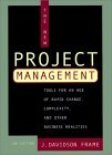|
|
|
|
|
|
Planning and Control (UMTPM251)
|
|
|
Overview
Effective planning and control entails developing skills that go far beyond mastery of Microsoft Project! To begin with, it requires the development of solid cost, duration, and resource estimates, which means that practitioners need to learn the principles of effective estimation. In planning projects, they also need to know how to construct product-oriented and task-oriented work breakdown structures (WBSs), since WBSs form the foundation of schedules and budgets. In the scheduling arena, today’s practitioners need to go beyond PERT/CPM and should get up to speed on brand new scheduling techniques, such as critical chain scheduling and time-boxed scheduling. And once the project is underway, they should be able to track actuals-versus-planned in order to keep the project under control.
Note: Students who take Planning and Control should not take UMTPM010. Critical Chain and Time-boxed Scheduling or UMTPM009. Effective Estimation.
|
Objectives
To have students develop a thorough grounding on concepts and techniques needed to deliver projects on time, within budget, and according to specifications.
|
What You Will Learn
- Elements of effective estimation, including: working with conceptual, preliminary, and definitive estimates; using the PERT Beta distribution to estimate costs, resource requirements, and task durations; conducting bottom-up and parametric cost estimates
- Developing product-oriented and task-oriented WBSs
- Principles of critical chain scheduling, including: avoiding the Student Syndrome; overcoming Parkinson’s Law; effective use of project, resource, and feeder buffers
- Principles of time-boxed scheduling, including prioritizing business requirements with the Poor Man’s Hierarchy and Pareto’s Rule; prioritizing technical requirements; and speeding development through parallel execution
|
PMBOK® Guide Process Areas
- Initiating
- Planning
- Executing
- Controlling
- Closing
|
PMBOK® Guide Knowledge Areas
- Project Time Management
- Project Scope Management
- Project Cost Management
- Project Risk Management
|
|
Instruction
 - Course modules containing cutting-edge knowledge developed by renowned experts in project management
- Course Textbook: The New Project Management, by J. Davidson Frame
- "Think and Review" section that helps you review key points of the modules
- Answers to the "Think and Review" section
- A final exam which contains multiple choice and true/false questions
- Certificate of Completion
|
Topics Covered
- Central role of estimation in project management
- Measurement—reliability and validity
- Forecasting—normative vs. extrapolation
- Need for risk assessment in estimating
- Estimation techniques: regression, Delphi, moving averages
- Pareto’s rule
- Data collection
- Cost estimating: bottom-up vs. top-down
- Life-cycle cost estimating
- Work breakdown structure (WBS)
- Organizational breakdown structure (OBS). Gantt charts. Milestone charts
- Working time vs. non-working time
- PERT/CPM networking
- Critical path concepts
- Review of scheduling S/W
- Integrated cost/schedule control with the Earned Value Method
- Measuring work performance: 50-50 Rule and milestone tracking
- Time-boxed scheduling
- Critical chain scheduling
- Basic economic concepts
- Financial concepts (e.g., capital budgeting, sunk costs)
- Accounting basics. S-curve
- Analyzing cost data
- Benefit-cost analysis
- History of earned value approach
|
|
|
|
|
|
|
|
|
|
|
|
|
|
Privacy Policy
| Contact Us |
Copyright © 1998-2026 University of Management and Technology (UMT) |
Consumer Information Disclosure
|